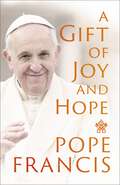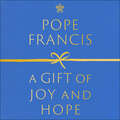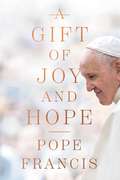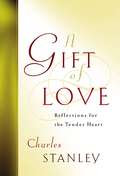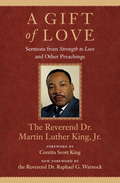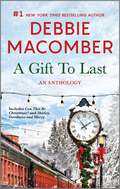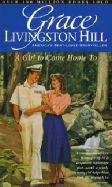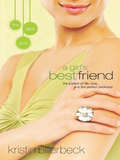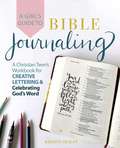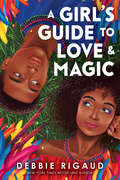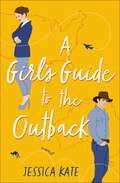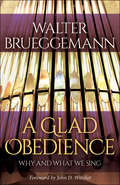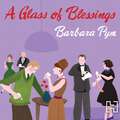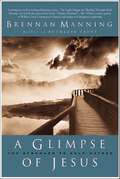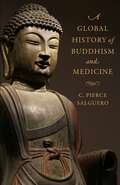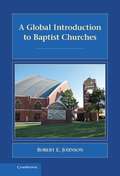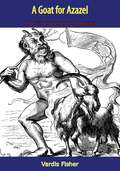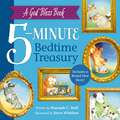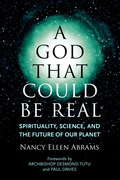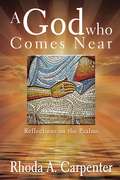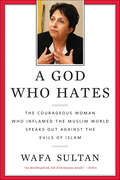- Table View
- List View
A Gift of Hope: The Tony Melendez Story
by Mel White Tony MelendezFrom the Publisher: The inspiring story of a young thalidomide victim and talented musician who has gained international recognition. Wonderful reading for anyone--especially those facing seemingly insurmountable difficulties. ... This is a beautifully, and positively, written autobiography. Melendez neither downplays his and his family's struggles resulting from his lack of arms, nor does he whine about them. Writing about his father, "Still, he knew that only in America would he find the kind of medical treatment I needed, so he put his own dreams aside and began to dream for me. He was young, strong, and determined to provide for each of us-but especially, I believe, for me. Imagine his growing frustration as he tried to support us on the minimum wage jobs that he could find. And there was no extra time or money to train in another field. [In Nicaragua, he was educated and accomplished in the fields of agriculture and animal husbandry.] Instead, he found himself in a huge pool of cheap labor as more and more unskilled young people migrated to America."
A Gift of Joy and Hope
by Pope Francis'This is Christian hope: the certainty of walking towards something that exists, not something I hope might be there.' In response to the devastating loss the world faced during the pandemic, Pope Francis was inspired to write a book to help people find hope and meaning. God is joyful, he writes. And God's compassion is no less than the deepest expression of God's joy, and the heart of all Christian preaching. The liberating revolution of the Gospel is encapsulated here. We are not supposed to carry burdens heavier than those we already have, but to bear witness to a new, beautiful and surprising horizon: to share a joy that has been prepared for everyone. From the anxieties of the age to the importance of nature, A Gift of Joy and Hope encourages readers to look outside themselves to embrace authentic beauty, change attitudes that exclude others, overcome life's challenges with courage and, trust that joy and hope are still possible, even in challenging times; for joy has the last word - always.
A Gift of Joy and Hope
by Pope FrancisPope Francis's third official book - already an international bestseller - on how to find joy in challenging circumstances.'This is Christian hope: the certainty of walking towards something that exists, not something I hope might be there.' In response to the devastating loss the world faced during the pandemic, Pope Francis was inspired to write a book to help people find hope and meaning. God is joyful, he writes. And God's compassion is no less than the deepest expression of God's joy, and the heart of all Christian preaching. The liberating revolution of the Gospel is encapsulated here. We are not supposed to carry burdens heavier than those we already have, but to bear witness to a new, beautiful and surprising horizon: to share a joy that has been prepared for everyone.From the anxieties of the age to the importance of nature, A Gift of Joy and Hope encourages listeners to look outside themselves to embrace authentic beauty, change attitudes that exclude others, overcome life's challenges with courage and, trust that joy and hope are still possible, even in challenging times; for joy has the last word - always. (P) 2022 Hodder & Stoughton Limited
A Gift of Joy and Hope
by Pope FrancisIn this encouraging book, Pope Francis explores the meaning of true joy and offers an inspiring message: even in dark times, the light of hope can shine bright. The past few years have been extremely challenging, but even in dark times, the light of joy can shine bright. True joy, says Pope Francis, is not a fleeting sentiment or a short-term solution to suffering; it springs from a solid hope that nothing and no one can take away. A Gift of Joy and Hope is an invitation to embrace authentic beauty and a reminder to be open to encountering God, even in the midst of challenges. In this inspiring collection, Pope Francis encourages readers to change attitudes that exclude others; to reveal the deep dissatisfaction we all hide; and to overcome life&’s challenges with courage and faith. He also challenges readers to hope without pessimism or doubt, to hope even in the midst of anxiety, to recognize the beauty all around us, and to let God show us how to deal with your doubts and fears. This book aims to encourage readers to look outside themselves and believe that hope is still possible and that joy always has the last word.
A Gift of Love: Reflections for the Tender Heart
by Charles F. StanleyLove has always been the need. Jesus has always been the answer. "The world is hurting for love," writes pastor and Bible teacher Charles Stanley. "Because God is infinite and full of compassion, He heard our cries and responded in the form of a perfect gift, Jesus." Consider this simple truth: all the wonderful attributes of God would be meaningless unless God was also a giver. He loves the world, and the evidence of that love is that he gave His Son. From this simple but profound premise, Dr. Stanley unfolds the riches of the giver and the glories of the gift. Stanley explores the many dimensions of God's generous nature, first in His character, then in the revelation of Himself through His Son, and finally in the impact of His magnificent gift. Written in a warm, daily devotional format, A Gift of Love will cause the height and depth of God's love to shine in your heart.
A Gift of Love: Sermons from Strength to Love and Other Preachings (King Legacy #7)
by Martin Luther King Jr.The classic collection of sixteen sermons preached and compiled by Dr. King As Dr. King prepared for the Birmingham campaign in early 1963, he drafted the final sermons for Strength to Love, a volume of his most well-known homilies. King had begun working on the sermons during a fortnight in jail in July 1962. While behind bars, he spent uninterrupted time preparing the drafts for works such as "Loving Your Enemies" and "Shattered Dreams," and he continued to edit the volume after his release. Revised in a fresh new edition, A Gift of Love includes these classic sermons, along with two new sermons. Collectively they present King's fusion of Christian teachings and social consciousness, and promote his prescient vision of love as a social and political force for change.
A Gift to Last: An Anthology
by Debbie MacomberTwo Christmas favorites from #1 New York Times bestselling author Debbie Macomber!Can This Be Christmas?On December 24, a crowded train is taking holiday travelers home for Christmas. But because of a snowstorm, this group of strangers ends up spending Christmas Eve together, stranded in a small New Hampshire station. Despite the cold and discomfort, they create an impromptu celebration that reminds them all what Christmas really means. Shirley, Goodness and MercyGreg Bennett hates Christmas. Divorced, virtually friendless and about to lose his business, he has no time for what he considers sentimental nonsense. It takes three angels to show him the truth. Shirley, Goodness and Mercy shall follow him…until he learns what Christmas is all about! Previously published.
A Girl During the War: A Novel
by Anita AbrielThe author of the &“unforgettable story of strength, love, and survival&” (Jillian Cantor, USA TODAY bestselling author) The Light After the War returns with a sweeping and evocative story of love and purpose in WWII Italy.Rome, 1943: University student Marina Tozzi is on her way home when she finds out that her father has been killed for harboring a Jewish artist in their home. Fearful of the consequences, Marina flees to Villa I Tatti, the Florence villa of her father&’s American friend Bernard Berenson and his partner Belle da Costa Greene, the famed librarian who once curated J.P. Morgan&’s library. Florence is a hotbed of activity as partisans and Germans fight for control of the city. Marina, an art expert, begins helping Bernard catalog his library as he makes the difficult trek to neutral Switzerland, helping to hide precious cultural artifacts from the Germans. Adding to the tension, their young neighbor Carlos, a partisan, seeks out Marina for both her art expertise and her charm. Marina, swept up in the romance, dreams of a life together after the war. But when Carlos disappears, all of Marina&’s assumptions about her life in Florence are thrown into doubt, and she&’ll have to travel halfway around the world to unravel what really happened during the war.
A Girl To Come Home To (Love Endures #3)
by Grace Livingston HillBack Cover: "Young and courageous Rodney Graeme had made a name for himself as a navy hero. Now he was returning home before being given a top-secret assignment in the states. Everyone in town came to greet him. Everyone including beautiful Jessica, the woman Rodney had loved, the woman who jilted him for a richer man while he was away. And unbeknownst to Rodney, Jessica's powerful husband is determined to use his lovely wife and Rodney's feelings for her--to his own advantage. Suddenly Rodney finds himself caught up in an espionage plot, fighting bravely against desperate odds. Then he meets a gentle young girl whose faith touches him deeply, and he discovers a strength to overcome--and the joy to be found in honest faith and real love."
A Girl's Best Friend
by Kristin BillerbeckThree friends. One spa. And an infinite amount of oversharing! From the outside, Morgan Malliard has it all: diamonds at her disposal, a willowy figure, a doting daddy, and all the elegance that money can buy. But money can't buy happiness--or an identity to call her own--and Morgan is realizing her perfect life has no purpose other than spectacular grooming (which isn't really a purpose at all . . . unless you're a chimpanzee). Then a falling-out with her father drop-kicks Morgan into the real world, and she is suddenly forced to get an actual job, wear affordable shoes, and cope with public transportation--not to mention deal with that mysterious hottie who may or may not be stalking her! It's time for a spa getaway with her best gals, Lilly and Poppy--because there's just something about lying under a pile of sweet-smelling papaya plaster that can help a girl figure things out. Like the fact that life isn't about living up to a perfect ideal, and that with God's grace, the beauty of it may just be in the flaws after all.
A Girl's Best Friend (Spa Girls Series #2)
by Kristin BillerbeckMorgan seems to have it all, but her etiquette-controlled, well-sculpted life has left her without an identity to call her own. Christian chick-lit.
A Girl's Guide to Bible Journaling: A Christian Teen's Workbook for Creative Lettering and Celebrating God's Word
by Kristin DuranDiscover how to express your love for the Lord with the creative and easy-to-follow, step-by-step techniques and projects in this inspirational Bible journaling guide for teen girls.Bible journaling is an incredible way to connect to Scripture. By creating art next to sacred text, your understanding of it will deepen, as will the meaning of your most precious hopes and prayers. But while you may be excited to start journaling, it can be hard to know where and how to start! That&’s where A Girl&’s Guide to Bible Journaling comes in. With an easy-to-follow introduction on lettering, explanations of the various tools you&’ll need, step-by-step instructions on creating the alphabet, and tips on how to design your layout, you&’ll be journaling in your Bible in no time! From colored pencil to watercoloring, you&’ll learn how to create beautiful, inspired artwork in the margins of your Bible, even if you&’re a complete beginner. Looking to delve deeper? You&’ll also learn other strategies for Bible journaling, including utilizing the margins for sermon notes, personal prayers, Bible study, Scripture meditation, and more.
A Girl's Guide to Love & Magic
by Debbie RigaudPerfect for fans of The Sun Is Also a Star and Blackout, this YA novel from Debbie Rigaud is a celebration of Haitian and Caribbean culture, and a story of first love, vodou, and finding yourself, all set against the backdrop of the West Indian Day Parade in Brooklyn.Cicely Destin lives for the West Indian Day Parade, the joyous celebration of Caribbean culture that takes over the streets of her neighborhood. She loves waving the Haitian flag, sampling delicious foods, and cheering for the floats. And this year? She’ll get to hang with her stylish aunt, an influencer known for dabbling in Haitian Vodou.And maybe spot her dreamy crush, Kwame, in the crowd.But fate has other ideas. Before the parade, a rogue, mischievous spirit seems to take possession of Cicely's aunt during a spiritual reading. Cicely hardly knows anything about Vodou, or how to get someone un-possessed. But it’s up to her to set things right--and the clock is ticking. She'll have to enlist the help of her quick-thinking best friend, Renee, and, as luck would have it...Kwame.Cicely, her friends, and the reckless spirit who is now their charge set off on a thrilling scavenger hunt to gather the ceremonial items they need. And along the way, will Cicely discover surprising powers of her on?Bestselling author Debbie Rigaud infuses this novel with sparkling wit, romance, and nuance that will keep readers riveted and enchanted.
A Girl’s Guide to the Outback
by Jessica KateHow far will a girl go to win back a guy she can&’t stand? This funny, sweet, and romantic story proves that opposites do attract—and that God has a sense of humor.Samuel Payton is a passionate youth pastor in Virginia, but below the surface, he&’s still recovering from the blow of a failed business and insecurities he can&’t shake. His coworker, start-up expert Kimberly Foster, is brilliant, fearless, and capable, but years of personal rejection have left her defensive and longing for a family. Two people have never been more at odds—or more attracted to one another. And every day at work, the sparks sure do fly.When Kimberly&’s ambitious plans for Sam&’s ministry butt up against his risk-averse nature, Sam decides that obligations to family trump his work for the church. He quits the ministry and heads home to Australia to help his sister, Jules, save her struggling farm. As Kimberly&’s grand plans flounder, she is forced to face the truth: that no one can replace Sam. Together they strike up a deal: If Kimberly comes to work on Jules&’s dairy farm and lends her business brains to their endeavor, then maybe—just maybe—Sam will reconsider his future with the church.As Kimberly tries her hand at Australian farm life, she learns more about herself than she could&’ve ever expected. Meanwhile Sam is forced to re-evaluate this spunky woman he thought he already knew. As foes slowly morph into friends, they wonder if they might be something even more. But when disaster strikes the farm, will Sam find it within himself to take a risk that could lead to love? And will Kimberly trust God with her future?
A Glad Obedience: Why and What We Sing
by Walter BrueggemannThe Christian practice of hymn singing, says renowned biblical scholar Walter Brueggemann, is a countercultural act. It marks the Christian community as different from an unforgiving and often ungrateful culture. It is also, he adds, an "absurd enterprise” in the midst of the hyper-busy, market-driven society that surrounds us. In this helpful and engaging volume, Brueggemann discusses both why we sing and what we sing. The first part of the book examines the Psalms and what they can teach us about the reasons that corporate song is a part of the Christian tradition. The second part looks at fifteen popular hymns, including classic and contemporary ones such as “Blest Be the Ties That Binds,” “God's Eye Is on the Sparrow,” “Once to Every Man and Nation,” “Someone Asked the Question,” and “We Are Marching in the Light of God,” and the reasons why they have caught our imagination.
A Glass Of Blessings (Virago Modern Classics #307)
by Barbara PymWilmet Forsyth is well dressed, well looked after, suitably husbanded, good looking and fairly young - but very bored. Her husband Rodney, a handsome army major, is slightly balder and fatter than he once was. Wilmet would like to think she has changed rather less.Her interest wanders to the nearby Anglo-catholic church, where at last she can neglect her comfortable household in the more serious-minded company of three unmarried priests, and, of course, Piers Longridge, a man of an unfathomably different character altogether.
A Glass Of Blessings: A Novel (Virago Modern Classics #307)
by Barbara Pym'I'd sooner read a new Barbara Pym than a new Jane Austen' Philip LarkinWilmet Forsyth is well dressed, well looked after, suitably husbanded, good looking and fairly young - but very bored. Her husband Rodney, a handsome army major, is slightly balder and fatter than he once was. Wilmet would like to think she has changed rather less.Her interest wanders to the nearby Anglo-catholic church, where at last she can neglect her comfortable household in the more serious-minded company of three unmarried priests, and, of course, Piers Longridge, a man of an unfathomably different character altogether.
A Glimpse of Jesus: The Stranger to Self-Hatred
by Brennan ManningBeloved Christian writer Brennan Manning has long been illuminating the transforming power of God's constant love for us in his bestselling books. Now he identifies self–hatred as the reason that so many of us seem unable to accept this incredible, unchanging love. By clearly examining and understanding Jesus' life, we can put self–hatred behind us forever and truly be transformed in the ways God intended.
A Global History of Buddhism and Medicine
by C. Pierce SalgueroMedicine, health, and healing have been central to Buddhism since its origins. Long before the global popularity of mindfulness and meditation, Buddhism provided cultures around the world with conceptual tools to understand illness as well as a range of therapies and interventions for care of the sick. Today, Buddhist traditions, healers, and institutions continue to exert a tangible influence on medical care in societies both inside and outside Asia, including in the areas of mental health, biomedicine, and even in responses to the COVID-19 pandemic. However, the global history of the relationship between Buddhism and medicine remains largely untold.This book is a wide-ranging and accessible account of the interplay between Buddhism and medicine over the past two and a half millennia. C. Pierce Salguero traces the intertwining threads linking ideas, practices, and texts from many different times and places. He shows that Buddhism has played a crucial role in cross-cultural medical exchange globally and that Buddhist knowledge formed the nucleus for many types of traditional practices that still thrive today throughout Asia. Although Buddhist medicine has always been embedded in local contexts and differs markedly across cultures, Salguero identifies key patterns that have persisted throughout this long history. This book will be informative and invaluable for scholars, students, and practitioners of both Buddhism and complementary and alternative medicine.
A Global Introduction to Baptist Churches
by Robert E. JohnsonCoinciding with the four-hundredth anniversary of the birth of the Baptist movement, this book explores and assesses the cultural sources of Baptist beliefs and practices. Although the movement has been embraced, enriched, and revised by numerous cultural heritages, the Baptist movement has focused on a small group of Anglo exiles in Amersterdam in constructing its history and identity. Robert E. Johnson seeks to recapture the varied cultural and theological sources of Baptist tradition and to give voice to the diverse global elements of the movement that have previously been excluded or marginalized. With an international communion of over 110 million persons in more than 225,000 congregations, Baptists constitute the world's largest aggregate of evangelical Protestants. This work offers insight into the diversity, breadth, and complexity of the cultural influences that continue to shape Baptist identity today.
A Goat for Azazel: A Novel of Christian Origins (Testament Of Man Ser.)
by Vardis FisherLUST AND REDEMPTION, SIN AND SALVATION—THE EPIC NOVEL OF A YOUNG ROMAN IN THE FLESHPOTS OF AN ANCIENT WORLD.HE SAW HIS MOTHER BURNED AT THE STAKEThis soul-searching experience changed an innocent young Roman into a pleasure-seeking hedonist lusting for flesh. Yet, there was something about the new religion that obsessed him. What was it that made Christian martyrs go to their deaths with a smile on their lips?...Christ had preached love; only through love could man be re-born. So it was that Damon set out in search of the answers to puzzling riddles about love and lust, the spirit and the flesh, barbarian pantheism and gentle Christianity…The latest in Vardis Fisher’s TESTAMENT OF MAN series. ‘The most ambitious project in present-day fiction!’—The New York Herald TribuneDAMON SOUGHT LOVE—from Levilla, the beautiful young Christian, who withheld her ripe body from him;—from Murdia, the sensualist, who knew how to arouse men with passionate abandon;—from Ayla, the voluptuous dancing girl, whose cloying movements invited a strange relationship;—from the father he never knew; from the religion he yearned to believe in...Here is the fascinating odyssey of a young Roman who sated himself in the dissolute world of the First Century...until he finally found the goal of his quest for love in a new and sublime experience.
A God Bless Book 5-Minute Bedtime Treasury (A God Bless Book)
by Hannah HallSweeten up bedtime with your favorite books from the bestselling A God Bless Book series (about 1.5 million copies sold)! The simple 5-minute format makes bedtime easy, and your child is sure to drift off to sleep feeling blessed and loved. A God Bless Book 5-Minute Bedtime Treasury from beloved author Hannah C. Hall will transform your busy days to a peaceful retreat at bedtime.With just five minutes, your active little one will settle down and be captivated by these adorable animals who thank God for His amazing blessings in all parts of life. Kids will love seeing puppies playing dress-up, bear cubs tying their shoes before school, giraffes wearing fun pajamas, owls singing about God's love, and so much more! Full of soothing rhymes and cuddly artwork from Steve Whitlow, this keepsake collection of bedtime stories featuresGod Bless You and Good Night,God Bless My Friends,God Bless My Boo Boo,God Bless My Family,God Bless My School, andGod Bless My Home, a brand-new story that families will cherish.With six favorite stories combined into one beautiful book, this treasury of bedtime stories will make nighttime routines easy and sweet! Share this for Christmas or at a baby shower or gift it to a friend who is looking to create peaceful memories at bedtime.Check out other titles in the A God Bless Book series:God Bless Our BabyGod Bless Our Bedtime PrayersGod Bless Our ChristmasGod Bless Our CountryGod Bless Our EasterGod Bless Our FallGod Bless You and Good Night: Touch and Feel
A God That Could Be Real
by Paul Davies Nancy Abrams Archbishop Desmond TutuA paradigm-shifting blend of science, religion, and philosophy for agnostic, spiritual-but-not-religious, and scientifically minded readers Many people are fed up with the way traditional religion alienates them: too easily it can perpetuate conflict, vilify science, and undermine reason. Nancy Abrams, a philosopher of science, lawyer, and lifelong atheist, is among them. And yet, when she turned to the recovery community to face a personal struggle, she found that imagining a higher power gave her a new freedom. Intellectually, this was quite surprising. Meanwhile her husband, famed astrophysicist Joel Primack, was helping create a new theory of the universe based on dark matter and dark energy, and Abrams was collaborating with him on two books that put the new scientific picture into a social and political context. She wondered, "Could anything actually exist in this strange new universe that is worthy of the name 'God?'" In A God That Could Be Real, Abrams explores a radically new way of thinking about God. She dismantles several common assumptions about God and shows why an omniscient, omnipotent God that created the universe and plans what happens is incompatible with science--but that this doesn't preclude a God that can comfort and empower us. Moving away from traditional arguments for God, Abrams finds something worthy of the name "God" in the new science of emergence: just as a complex ant hill emerges from the collective behavior of individually clueless ants, and just as the global economy emerges from the interactions of billions of individuals' choices, God, she argues, is an "emergent phenomenon" that arises from the staggering complexity of humanity's collective aspirations and is in dialogue with every individual. This God did not create the universe--it created the meaning of the universe. It's not universal--it's planetary. It can't change the world, but it helps us change the world. A God that could be real, Abrams shows us, is what humanity needs to inspire us to collectively cooperate to protect our warming planet and create a long-term civilization.From the Hardcover edition.
A God Who Comes Near: Reflections on the Psalms
by Rhoda A. CarpenterThis book is written to reawaken awareness of both the beauty of the psalms and their ability to speak with relevance to our contemporary culture--a generation in danger of losing the psalmist&’s voice. It is written for those who may have felt marginalized by church or society, whether from loss, tragedy, illness, or misuse of power. May this generation hear the voice of the psalmist pointing them to a God who desires honest expression, who comes close to listen to their cries, and points them to a deeper understanding of who he is and how he loves. May the words of the psalmist lead them out of isolation and into authentic community.The author&’s approach to the psalms begins with recognition of the intertwining of imagery with the literary structure of the poetry found in the psalms. The imagery in the psalms comes from an earthy connection of the psalmist with the land of scripture. Understanding the imagery allows the reader to &“see&” the psalms and receive the message. It deepens the relevance of the psalms to speak into the myriad contexts in our present day multi-cultural world. Recognition of the religious and social dynamics of ancient Israelite life--such as kingship, Zion as a place of God&’s presence, and the covenant relationship of a people with their God--provide further clues to understanding the message of the psalms.Along with the rich imagery present in the psalms, this book explores the literary structure of the poetry in the psalms. Recognition of key characteristics of Hebrew poetry allows the words to &“sing.&” In every psalm a vivid echo of ancient voices resounds, building century upon century of expression, reaching into the present. If one reads carefully, the melodies and message can be heard. The music of the psalms breathe with life and relevance.Psalms are filled with movement to hope and praise. Yet, they address the reality that life at times hurts. The psalmist gives honest voice to pain and affirms God&’s presence in the darkest moments of life. This book explores the importance of lament both individually and in community as a vehicle to healing and a deeper understanding of God&’s care.The book closes with an examination of five select psalms that are representative of different types of psalms found in the psalter. They were chosen because of personal relevance. Through imagery, structure, and voice the psalms convey movement from honest expression to hope. Hope leads to thanksgiving. Praise resounds because of who God is and how he cares.
A God Who Hates: The Courageous Woman Who Inflamed the Muslim World Speaks Out Against the Evils of Islam
by Wafa SultanFrom the front page of The New York Times to YouTube, Dr. Wafa Sultan has become a force radical Islam has to reckon with. For the first time, she tells her story and what she learned, first-hand, about radical Islam in A God Who Hates, a passionate memoir by an outspoken Arabic woman that is also a cautionary tale for the West. She grew up in Syria in a culture ruled by a god who hates women. "How can such a culture be anything but barbarous?", Sultan asks. "It can't", she concludes "because any culture that hates its women can't love anything else." She believes that the god who hates is waging a battle between modernity and barbarism, not a battle between religions. She also knows that it's a battle radical Islam will lose. Condemned by some and praised by others for speaking out, Sultan wants everyone to understand the danger posed by A God Who Hates.

